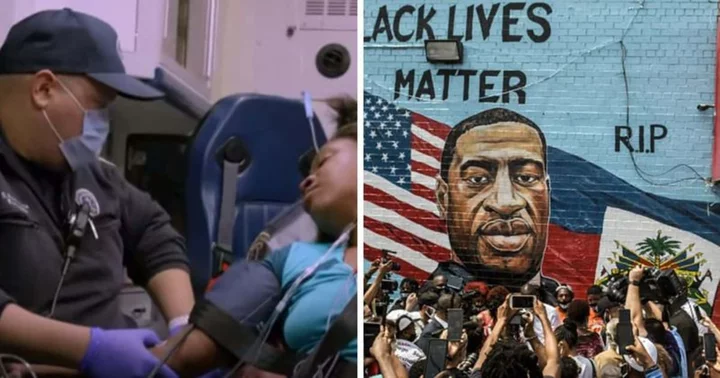MINNEAPOLIS, MINNESOTA: A national organization of coroners recently debunked the idea of “excited delirium” as a medical condition. The fictitious condition has often been cited by law enforcement authorities as a probable cause of death in cases where community members died from police violence. Back in 2021, defense lawyers at the murder trial of former Minneapolis officer Derek Chauvin argued that victim George Floyd showed signs of excited delirium.
However, the National Association of Medical Examiners (NAME) recently announced that they would not recognize the condition, starting this spring. “NAME does not endorse use of the term ‘excited delirium’ as a cause of death,” Dr Joyce DeJong, the group’s president, told Colorado’s 9News. The statement comes as part of an investigation by the network that found that the condition was cited as a cause of death in 139 incidents since 2010, two of which involved deaths after encounters with cops.
READ MORE
What is excited delirium?
Excited delirium has long been considered a controversial diagnosis, characterized by extreme agitation, acute distress, aggression, delirium, and sudden death. It is usually said to be diagnosed during postmortem in young adult males, especially African-American men, who were physically restrained at the time of death, mostly by a law enforcement personnel. Additionally, the condition is also associated with the use of drugs that alter dopamine processing and hyperthermia, according to the National Institute of Health.
While the condition is primarily recognized by the American College of Emergency Physicians, it is not recognized by the World Health Organization, the American Psychiatric Association, the American Medical Association, the American Academy of Emergency Medicine, or the National Association of Medical Examiners. The condition is also not listed in the Diagnostic and Statistical Manual of Mental Disorders or the International Classification of Diseases.
The American Medical Association and the American Psychiatric Association previously confirmed that they does not recognize the condition. Meanwhile, an expert from Howard University said the condition cannot provide a “real explanation” for death. “Excited delirium is often used when there’s a death associated with a physical altercation between a citizen and law enforcement,” Dr Roger A Mitchell Jr, chair of the pathology department at Howard University, told The Associated Press earlier this year. “It’s not a real explanation for the death,” he added further.
Police departments have continued to claim 'excited delirium' as a cause of death
Despite experts and coroners denouncing the condition of “excited delirium,” police departments around the US have continued to inform training officers about the condition and claimed that it justifies civilian deaths, The Independent noted. More recently, former Minneapolis officer Chauvin's defense team at his 2021 murder trial over the death of Floyd mentioned “excited delirium” in court.
The lawyers argued that Chauvin’s act of kneeling on Floyd’s neck for nine minutes until he lost consciousness was justified because the latter showed signs of excited delirium. However, prosecutors claimed that the condition was used as a “story” to shift the blame. “Mr Floyd didn’t even have a pulse,” prosecutor Jerry Blackwell said during his closing arguments.
“That didn’t justify keeping your knee on his neck when you should have been administering CPR, when you could have brought him back to life again because you’re afraid that he would come to, with no pulse and rampage the city,” he added. “That’s the sort of thing you see in Halloween movies, ladies and gentlemen. Not in real life,” the prosecutor stated.
Law enforcement officials from Aurora, Colorado, also previously claimed that the 2019 killing of Elijah McClain was justified because of excited delirium. McClain was placed in a cartoid chokehold during the arrest. The hold has since been banned. An onlooker reportedly called 911, saying that McClain was placed on a chokehold while he was seen wearing a ski mask and waving his arms.
His family later said that McClain, who was anemic, was wearing a ski mask to prevent getting chills. McClain had his headphones in and did not respond to calls from police, who placed him in a chokehold in response. McClain reportedly cried, vomited, and asked police to respect his boundaries. Officials later ruled that he died after being injected with ketamine by paramedics.
‘Excited delirium is make believe’
Social media users were quick to respond to experts denouncing excited delirium as a cause of death. “Excited delirium is make believe. What happened is the cops caused this individual’s death,” one user tweeted in connection to Floyd’s death. “There is no such thing as excited delirium,” another added. “Thanks for reporting on this, Chris. It is indeed a big deal. This became the explanation du jour to explain Taser deaths in the past 15 years. It's always been a sham,” a third user commented.
One said, “The scandal is that such a cockamamie concept was ever considered a valid “explanation” in the first place” while another quoted an expert saying, “‘Excited delirium should never be used as a term that by itself can be identified as the cause of death. The use of excited delirium as a term in guidance to police officers should also be avoided’ Day 54 -evidence on ‘cause of death’ pathologist Dr Shearer.”
This article contains remarks made on the Internet by individual people and organizations. MEAWW cannot confirm them independently and does not support claims or opinions being made online.









